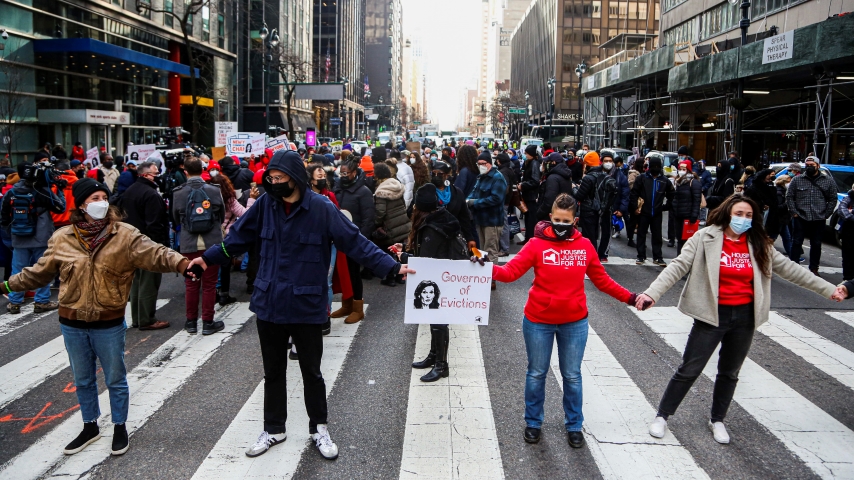Judicial Dismissal: The Consequences of Nassau County’s Mask Ban
Photo by Pablo Monsalve/VIEWpress via Getty Images
On August 22nd, an advocacy organization called Disability Rights New York filed a class action complaint regarding a recently passed Nassau County law called the “Mask Transparency Act.” The group argued that the law violated the Americans with Disability Act and posed a threat to public health, in particular the health of disabled individuals. A month later on September 25th, U.S. District Judge Joan Azrack dismissed that suit, arguing the plaintiffs lacked standing thanks to a carveout for those who wear masks for health reasons.
The law, and the subsequent lawsuit’s dismissal, are setting a dangerous precedent.
This ban was established in response to demonstrations protesting Israel’s ongoing genocide in Palestine, where many individuals have masked to protect their identities in an era of mass surveillance and to prevent the spread of disease, emphasizing that public health and safety must be a collective effort. In July, New York Governor Kathy Hochul stated her support for mask bans on the New York City Subway and cited a group of masked individuals committing “antisemitic attacks,” but provided no proof that any of the alleged perpetrators were masked. One of the first arrestees of the Nassau County mask ban was a Palestine solidarity activist, arrested for wearing a keffiyeh in public.
Across the country, mask bans have been established under the guise of public safety and protection. Meanwhile, long Covid persists as a mass disabling event, and vaccination rates as new shots roll out remain dismal. Masking is a critical public health option, in particular for individuals who are immunocompromised or disabled, allowing them to exist safely in public when they are at a higher risk of infection, hospitalization, and death due to Covid-19.
Though Judge Azrack cited the Nassau County mask ban’s health reasons exception, the law also states that law enforcement officers can question masked individuals or force them to remove their masks entirely. In an era rife with repeated examples of anti-Black and anti-disabled bias from the fascist police state, advocacy groups and disabled folks of color are understandably concerned about the potential for increased police harassment associated with mask bans. Furthermore, imprisoned individuals are often disabled by the prison system, due to lack of access to medical care, mental health trauma, solitary confinement, and abuse.
Masks have uses far beyond Covid and preventing the spread of disease, from air pollution protection at a time when climate change will continue to increase the likelihood of wildfires, or a check against the ongoing threat of facial recognition technology. They also serve as a barrier against allergens and respiratory irritants, relieving those with sensitivities or chronic conditions. Finally, masks can foster a sense of community and collective responsibility, reminding us to prioritize the health and safety of one another in shared spaces.
As mask bans proliferate across the country, it is crucial to recognize that such measures can have devastating implications for those who rely on masks to navigate public spaces safely. This dismissal serves as a stark reminder that the state does not simply disregard marginalized communities, it actively targets them, marking their bodies for further disablement and death. The intersection of disability justice and public health clearly remains an urgent issue in our society, one that we must collectively work on to keep each other safe.